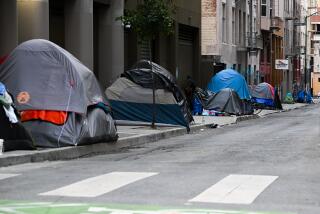PERSPECTIVE ON POVERTY : Welfare Is Integral to Our System : Thereâs no way private enterprise can create enough decent jobs even for those who are able and want to work.
Some politicians say that ending welfare will improve the character of those who depend on it--make them think twice about having kids, getting divorced or just being lazy. Presumably, once these folks are shaped up by the removal of their safety net, theyâll put on clean clothes, find respectable jobs and start paying taxes like the rest of us. Banish food stamps, Medicaid and aid to poor moms with a wave of the congressional wand, and voila , âpersonal responsibilityâ will be restored, making America a wondrous âopportunity society.â
Has anyone asked business people if theyâre ready to hire millions of new workers and pay them a living wage? As one who has started companies and helped create jobs, I can answer that question. There are not now and will not be in the foreseeable future jobs for most of those on welfare--certainly not jobs that will lift them out of poverty. This is not the fault of unwed mothers, unimaginative business people or even soft-hearted liberals. It is a consequence of private enterprise as we know it.
Here are some realities:
First, itâs the explicit policy of the Federal Reserve Board to keep 6% of our work force unemployed. Our economy must maintain this level of joblessness, the Fed insists, lest inflation rear its head and bondholders lose value. If too many Americans are employed, the Fed will raise interest rates to throw people out of work. Since the Fedâs arithmetic excludes employable adults who have stopped looking for work as well as those who have exhausted their unemployment benefits, we can say that capitalism as we know it requires roughly one-tenth of its potential workers to be jobless for the sake of price stability.
Second, thereâs a need for dead-end, low-paying, often part-time jobs--jobs no one can support a family on. Yet whenever anyone suggests raising the minimum wage, the outcry is that it will cause a loss of these jobs. Thus the choice for millions is poverty wages or no wages at all, meaning capitalism as we know it requires another sizable portion of our workers to live at a bare subsistence level and their children to grow up with inadequate nutrition, health care and physical safety.
Third, thereâs the simple demographic reality that, in any sample group of people, a certain number will be too old, too sick or too distraught to perform paid work. And last, there are such recent trends as the entry of women into the labor pool, the export of manufacturing jobs, corporate downsizing in response to global competition and the frenzy to shrink the public sector.
The bottom line is that thereâs no way, under modern capitalism, to end the welfare state. The good jobs just arenât there. So, like those who say drugs, pornography and sin will go away if outlawed, those who persist in attacking welfare are not merely wrong but dangerously wrong.
Of course, we could jettison our capitalist system in favor of a command-style economy in which, as Russians used to say, âWe pretend to work and they pretend to pay us.â That would get people off welfare by housing them in subsidized, inefficient enterprises--a course few in Washington would advocate. Or we might remain capitalist and ask charities to provide the needed social safety net. Such supplication would be quaint but not likely to be rewarded, since human-services agencies now get 30% of their budgets from government, and few Americans have volunteered to replace that funding with charitable gifts, much less to contribute the extra billions it would take to replace welfare.
So we are left with two alternatives: the welfare state more or less as we know it or a great increase in neediness, despair and crime.
Winston Churchill once said that democracy was a flawed political system, but less flawed than any other. The same might be said of welfare in a capitalist economy. As distasteful and degrading as public assistance is, it is less distasteful and degrading than people begging, stealing and starving on the streets. To pretend otherwise is demagoguery and will surely lead to tragedy.
More to Read
Inside the business of entertainment
The Wide Shot brings you news, analysis and insights on everything from streaming wars to production â and what it all means for the future.
You may occasionally receive promotional content from the Los Angeles Times.








